Please right-click on the link below and choose ‘Save Target As’ to download the file. You may find the English translation of this persian poem below.
Persian poetry with English translation: Ahmad Shamlu reads a poem of Hafez
Hafez Ahmad ShamluThe above poem is in MP3 format now
New Words:
![]() = /sa:l ha:/ = years / for years
= /sa:l ha:/ = years / for years
![]() = /tælæb kærdæn/ = to demand / to beg
= /tælæb kærdæn/ = to demand / to beg
![]() = /ja:m/ = cup (here, like world cup, not a tea cup)
= /ja:m/ = cup (here, like world cup, not a tea cup)
![]() = /ja:m -e – jæm/ = this is the name of a kind of cup explained above. In our Persian literature, this cup is believed to be a kind of cup in which one can see the past or the future events. It is believed that one of the kings in thousands of years ago had such a thing. Whatever it is, this expression is used symbolically in our Persian literature for “Recognition” or “Enlightenment”. Hafez is the master of using such kind of expressions in our classical poetry.
= /ja:m -e – jæm/ = this is the name of a kind of cup explained above. In our Persian literature, this cup is believed to be a kind of cup in which one can see the past or the future events. It is believed that one of the kings in thousands of years ago had such a thing. Whatever it is, this expression is used symbolically in our Persian literature for “Recognition” or “Enlightenment”. Hafez is the master of using such kind of expressions in our classical poetry.
![]() = /a:n cheh/ = what (example, what you say is …)
= /a:n cheh/ = what (example, what you say is …)
![]() = /ze biga:neh/ = from a stranger
= /ze biga:neh/ = from a stranger
= /tæmæna: kærdæn/ = to beg / to request
= /sædæf/ = shell (the place of pearl under the sea)
= /konu: mæka:n/ = time and place
= /gom shodega:n/ = the lost / those who are lost
= /læb/ = (here) beach / the outer part of the sea
= /læb -e – dærya:/ = seashore
= /dær hæmeh æhva:l/ = in all moments
= /nemididæsh/ = he wouldn’t see him
/væ/ is pronounced as /væ/ in most cases. However, in literature and daily conversation it is normally replaced with /o/ sound. For example: /hæsæn -o -ali/ for /hæsæn væ ali/.
= /Khoda: ya: mikærd/ = he was calling God on and on.
= /moshkel/ = problem / difficulty
= /bær -e-/ = here, to – close to
= /pir -e- mogha:n/ = master / rabbi
Note: it is not very easy to translate Hafez. His word is full of ambiguity, allusion and many different words that have been remained ambiguous to us until now. Many writers have written hundreds of pages for just one word he has used marvelously interesting. Still, no one knows the exact meaning of this very word. Fortunately, This particular word /rend/ is not used in this poem! This man had a different ability in using words and structures that, after more than eight hundred years, are still fresh in our culture. He has mosque for tavern and vise versa. Four different people might interpret his works in four different ways, and all of them seem right. Yet, the fifth person may introduce a different interpretation that is true too! His work is unbelievingly flexible.
Unlike Rumi who had a very well known master, Hafez has never introduced a person as his master. He has called rabbi or master for many times. However, if you explore his words more deeply, you will see that his master is not a person. In the above expression /pir _e_ mogha:n/, he refers to his master (pir) who lives in /deir _e mogh:an). This place rather seems a spiritual place than a physical building. Therefore, the master who lives in a spiritual place that is not made of construction materials (like stone or wood) should be a non-human master. Therefore, the place of this master is in your heart, and the master is the recognition or spiritually awareness. In short, /pir _e_ mogha:n/ is the spirit of truth that resides in your heart (deir_e_ mogha:n/.
= /du:sh/ = the literary form of the word /dishæb/, which means last night.
= /ku:/ = who (in a clause-based pattern)
= /betæ i:d_e_ næzær/ = with one look
= /hæl kærdæn/ = to solve / to remove (a problem)
= /beh dæst/ = in (one’s) hand
= /ændær/ = /dær/ = in / inside
= /sa:heri/ = to do magic tricks
= /pish/ = before / in presence
= /æsa:/ = rod / stick (here, it refers to the Rod of Moses.
= /yæd_e_ beiza:/ = white hand – there is an allusion here. It refers to the story of Moses who turned the Rod into a big snake.
= /ya:r/ = very close friend / beloved
= /kæzu:/ = /keh æz u:/ = because of him
= /sær _e_ da:r/ = the head or the top of gallows
= /hoveida: kærdæn/ = to disclose / to unveil
= /værægh/ = sheet (of paper or flowers)
= /kha:ter/ = favor (of somebody or something) – /beh kha:ter _e _ to/ means just for you, just in favor of you – also: remembering – rememberance
= /mohæsha: kærdæn/ => I think it’s the old form of
/ha:sha: kærdæn/ = to deny
= /ru:hol ghodos/ = the holy spirit
= /ba:z/ = (here) again / once more
= mædæd færma:yæd/ = (if) he helps – this word is a very polite form of the following word.
= ja:m _e_ jæha:n bin/ = (see /ja:m _e_ jæm above)
= /hækim/ = in old Persian /hækim/ means doctor. In this poem, it means God
= /gonbæd _e _ mina:/ = refers to “Sky”
= /mikærd/ =
/misa:kht/ = he was making
= /selseleh/ = like chain – Hafez refers to the woven hair of beautiful girls as chains that imprison the lover!
= /æz pei ye chist/ = for what reason?
= / geleh kærdæn/ = to complain



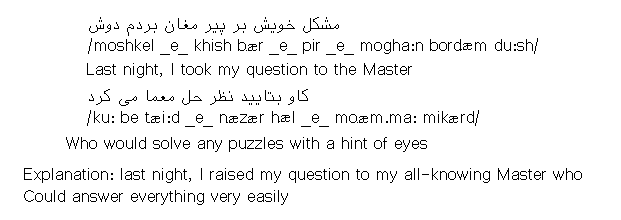
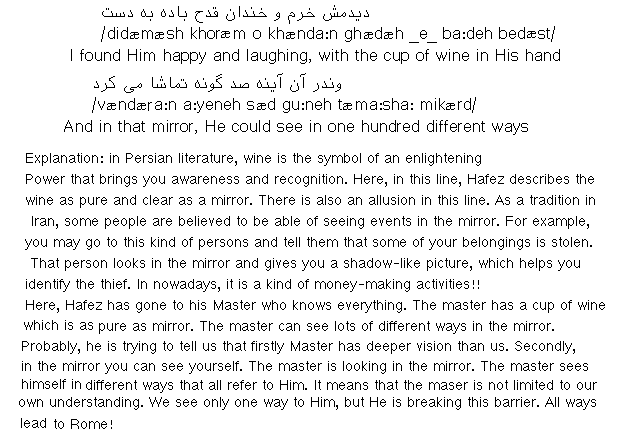
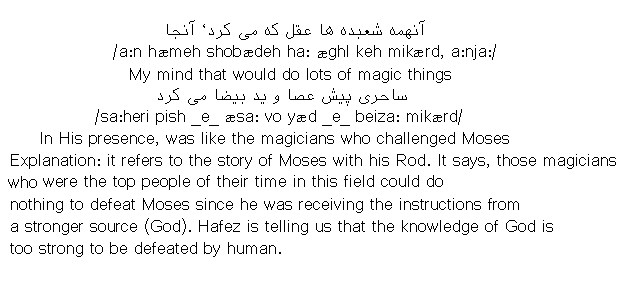
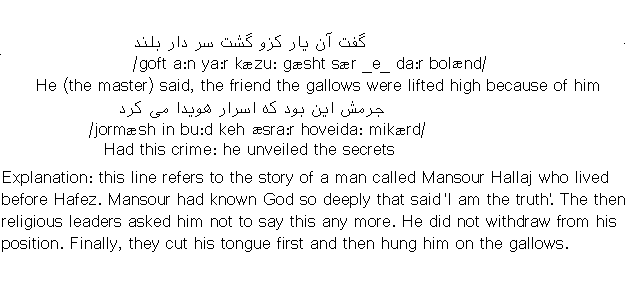
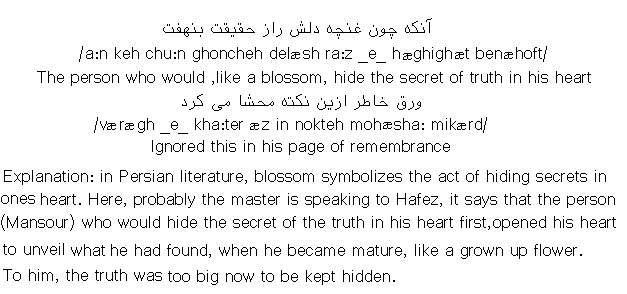
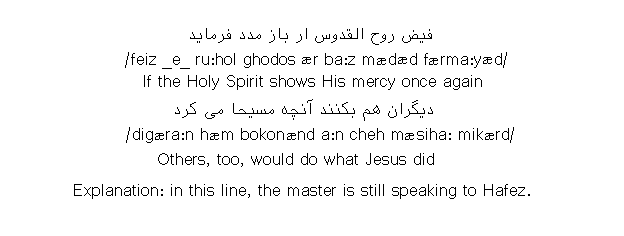
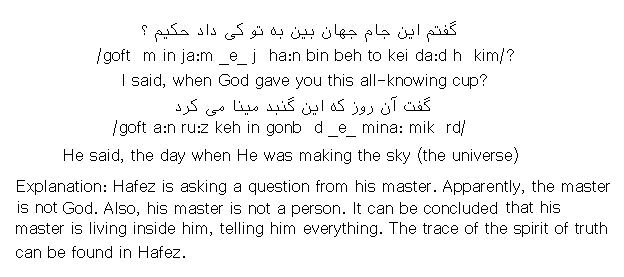
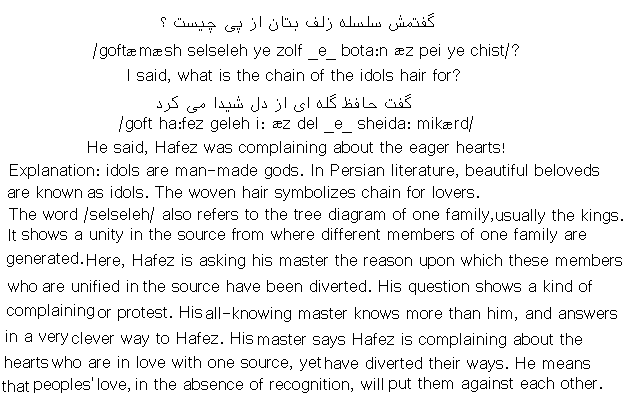
John Manning
April 13, 2016 @ 2:10 am
It is wonderful that you want to introduce us to great masters like Hafez — but this is not simple, contemporary Farsi. To me, it would seem much more useful to start with simple, contemporary Farsi. And to have your speaker speak SLOWLY without the complication of music as was the case with songs in earlier Useful Drill segments.